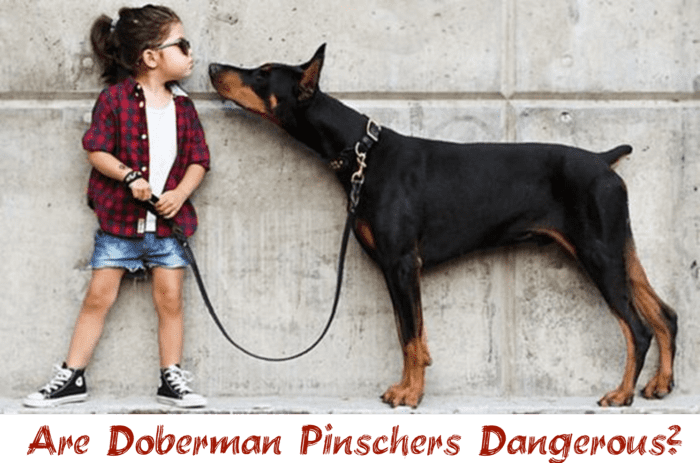9 Countries That Ban or Restrict Doberman Pinschers
Is It Legal to Own a Doberman Pinscher?
Doberman Pinscher dogs are powerful, fearless, and intelligent. They're one of the most respected breeds for police and military work, after the German Shepherd. They are very loyal and obedient companions—a well-trained Doberman makes a good family pet, and their dedication to their owners is unmatched.
These qualities make them one of the most popular dog breeds in the world—at least, in the countries where they aren't banned or restricted.
Are Doberman Pinschers Dangerous?
All dogs have their own personalities, and a properly and consistently trained and socialized Doberman is not likely to be dangerous. However, Dobermans were bred to be personal protection and guard dogs, making them typically reserved, highly protective, and aloof dogs that don't tend to welcome strangers.
In a study featured in Applied Animal Behaviour Science, the Doberman Pinscher ranked relatively high in stranger-directed aggression, low in owner-directed aggression, and average in dog-directed aggression. In many countries, breed-specific legislation (BSL) considers Dobermans to be naturally aggressive, so they are banned or restricted.
In This Article
- Quick Facts About the Doberman
- What Is Breed-Specific Legislation?
- Reasons for Breed-Specific Legislation
- 9 Countries Where Doberman Pinschers Are Banned or Restricted
- Check Your Local Laws
Quick Facts About the Doberman
- Origin: Apolda, Germany
- Developed by: Karl Friedrich Louis Dobermann, in about 1890
- Other Names: Dobermann, Dobie, Dobe
- Breed Category: Working group
- Breed Recognition: German Kennel Club in 1899; AKC (American Kennel Club) in 1908
- Height: 68–72 cm (27–28 in) for males; 63–68 cm (25–27 in) for females
- Weight: 35–45 kg (75–100 lb) for males; 27–40 kg (60–90 lb) for females
- Life Span: 10–13 years
What Is Breed-Specific Legislation?
Breed-specific legislation (BSL) refers to the laws and guidelines that either prohibit (ban) specific dog breeds in certain areas or determine which dogs can be kept subject to certain conditions. Commonly banned breeds have been identified as being potentially dangerous in public or used for illegal activities like dog fighting.
Dog breeds not allowed under any conditions are said to be prohibited or banned, and dog breeds that are allowed under certain conditions are said to be restricted.
Specific guidelines are determined by what the local BSL authority decides. Examples of conditions that might have to be met to own a specific breed include:
- The dog owner's age must be over 16 or 18 years.
- The owner already has experience in rearing the breed.
- The dog is required to wear a muzzle in public places.
- The dog owner can take the dog to public places only during allotted times (ex: 10.00 a.m. to 6:00 p.m.).
Note: The above are just example restrictions. Always check your own local laws to ensure you're properly complying with the BSL in your area.
Reasons for Breed-Specific Legislation
There are a number of reasons why some countries feel they must ban specific dog breeds, including the following:
- Dog bite statistics: Some breeds have a history of aggressively biting and/or are the breeds with the most damaging bites.
- Tendency toward aggression: Some breeds may have a tendency to attack or may be thought to be a risk to public safety.
- Used for illegal activities: Unfortunately, some excellent breeds are used for illegal activities like dogfighting and are, therefore, banned.
- Rare or unrecognized breeds or wolf hybrid dogs: In some countries, crossbreeds or mutts are banned because they are believed to have unpredictable behavior. If a certain breed is banned, mixing it with a legal breed will also make the mixed dog illegal.
- Poor health history: Dogs that have poor health or behavior records may be banned. In certain countries with extreme weather, some dog breeds that will not do well in the climate may not be allowed to live there.
9 Countries Where Doberman Pinschers Are Banned or Restricted
- Bermuda (Restricted)
- Brandenburg, Germany (Banned)
- Ireland (Restricted)
- Malaysia (Restricted)
- Qatar (Banned)
- Romania (Restricted)
- Shanghai, China (Banned)
- Singapore (Restricted)
- United Arab Emirates (Banned)
1. Bermuda (Restricted)
About 20 dog breeds have been restricted in Bermuda, including the Doberman Pinscher. Acquisition of a restricted breed dog requires pre-approval, and prohibited dogs may not be imported or used for breeding.
Bermuda has relatively strict laws for dog owners of all breeds. You cannot keep a dog without a license, and you have to renew it every year. Your dog must wear its numbered license tag, which will be or was issued at the time of its initial licensing.
Dogs must be kept on a leash in public, unless the dog is in a designated off-leash area, and no matter the area, the dog must remain under your control at all times.
2. Brandenburg, Germany (Banned)
Breed-specific legislation in Germany has prohibited several aggressive dog breeds, including the American Staffordshire Terrier, Bull Terrier, Pit Bull Terrier, and Staffordshire Bull Terrier. These dogs or any cross-breeds are not allowed for import.
Several other dog breeds are prohibited or restricted at the state level, and in Brandenburg, Germany, the Doberman is completely prohibited.
3. Ireland (Restricted)
Ireland's breed-specific legislation restricts 11 different dog breeds, including Pit Bulls, German Shepherds, Rottweilers, and Doberman Pinschers. Dogs of any restricted breed are not allowed to be taken into public places without a leash, muzzle, or license. The dog owner must be over 18 and capable of handling the dog.
4. Malaysia (Restricted)
Breed-specific legislation in Malaysia has prohibited seven dog breeds, including the American Pit Bull Terrier, American Bulldog, and others. Any of these prohibited dogs may not be imported or used for breeding in Malaysia.
Six dog breeds, including the Doberman Pinscher and German Shepherd, have been restricted. Any dog of a restricted breed must be kept on a leash and muzzle when in public and always handled by an experienced owner.
5. Qatar (Banned)
The breed-specific legislation of Qatar has banned several dog breeds, including Doberman Pinschers, American Pit Bull Terriers, Afghan Hounds, and Great Danes. None of these prohibited dogs may be imported or used for breeding in the country.
6. Romania (Restricted)
Romania's breed-specific legislation has prohibited the American Pit Bull Terrier, the Boerbol, the Ban Dog, and any related crosses. Any of these prohibited dogs may not be imported or used for breeding in Romania.
Restricted dog breeds include the Doberman Pinscher, German Shepherd, Belgian Malinois, Dogo Canario, Komondor, Kuvasz, and Riesenschnauzer, and they are required to wear a muzzle in public places.
7. Shanghai, China (Banned)
There is no national breed-specific legislation in China; you can own almost any breed of dog. However, this rule does not apply in three cities: Shanghai, Chengdu, and Beijing. In these cities, there are breed restrictions and prohibitions.
About 40 dog breeds are considered dangerous, including Dobermans, Pit Bulls, Tibetan Mastiffs, and Bulldogs. Many of these dogs are not allowed in public places, and many, including the Doberman, are outright prohibited in Shanghai.
8. Singapore (Restricted)
The breed-specific legislation of Singapore has prohibited the importation and breeding of seven dog breeds, including Pit Bulls, Akitas, Tosas, Neapolitan Mastiffs, and any crosses of these breeds.
Restricted dog breeds, including the Doberman Pinscher and German Shepherd, have to be leashed and muzzled in public and undergo mandatory obedience training.
9. United Arab Emirates (Banned)
Breed-specific legislation in the UAE has identified several "dangerous dog breeds," and they are banned. None of these prohibited dogs may be imported or used for breeding in the UAE.
The list of dangerous dog breeds in the UAE includes the following:
- Boxers
- Doberman Pinschers
- Mastiffs
- Pit Bulls
- Presa Canarios
- Rottweilers
- Tosas
- Any hybrids or mixes of the above
Check Your Local Laws
Keep in mind that laws can change, and it's your responsibility to ensure that you're complying with the breed-specific legislation in your area, no matter how strict or unfair some of the regulations might seem.
Resources and Further Reading
- Breed-Specific Legislation | NAIC
Breed-specific legislation (BSL) are laws that regulate or ban dog breeds which are believed to be dangerous to humans and other animals. - Breed-Specific Legislation (BSL) FAQ | DogsBite.org
Our Breed-Specific Legislation FAQ answers the most frequently asked questions about pit bull ordinances, the effectiveness of these ordinances, and much more. - Doberman Pinscher Dog Breed Information | AKC
Is the Doberman Pinscher the right breed for you? Learn more about the Doberman Pinscher, including personality, history, grooming, pictures, videos, and the AKC breed standard.
This article is accurate and true to the best of the author’s knowledge. Content is for informational or entertainment purposes only and does not substitute for personal counsel or professional advice in business, financial, legal, or technical matters.
© 2022 S RAI






















